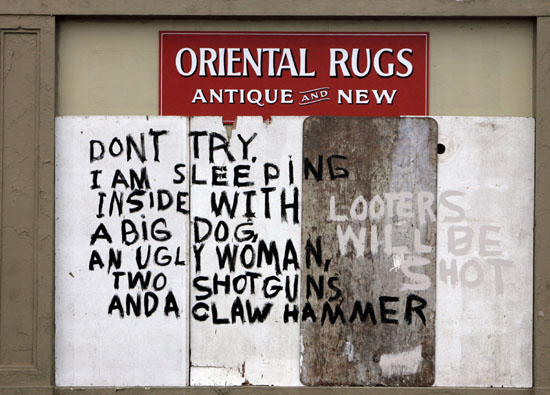Chapter 10
Can't We Just Get Along Without Fighting?
"Human war has been the most successful
of our cultural traditions."
—Robert Ardrey, anthropologist
Why can’t we humans—the highest species, the most intelligent, enlightened, and spiritual of all animals—conduct our affairs peacefully? Why do we behave as we do? The answer is painfully simple: we are but animals. Our modern skulls house stone-age minds. As a Cato Policy Report confirms, “The key to understanding how the modern mind works is to realize that its circuits were not designed to solve the day-to-day problems of a modern American—they were designed to solve the day-to-day problems of our hunter-gatherer ancestors.”[1]
Man has innate biological instincts inherited from his primate ancestry, such as eating to satisfy his hunger, having sex to reproduce his species, and aggressive behavior for survival. Although violence is a destructive manifestation of that aggression, those same instincts also provide important constructive benefits that man needs in order to adapt and survive in a harsh environment. This aggressive drive is just as important for man to have, as is his innate ability to inhibit his basic emotional drives. We may prefer to think of ourselves as “a fallen angel, [but in reality, we are] a risen ape.” [2]
In August of 2005, Hurricane Katrina ravaged the U.S. Gulf Coast as it shattered lives, destroyed homes, ruined businesses, and eliminated thousands of jobs. In the midst of this grave natural disaster, most of the affected victims coped as best they could, waiting to be rescued. Many of the unaffected people donated generously to relief agencies and took refugees into their homes. A catastrophe brought out the best in people.
However, a catastrophe also brings out the worst in people. There was rampant violence and widespread looting. Snipers began shooting at MEDEVAC helicopters, rescue and recovery workers, and hospital employees. Gangs set fire to malls, stole cars from dealerships, raped defenseless hurricane victims, and beat homeless people. It is estimated that looters broke into and plundered about ninety percent of the shops in New Orleans’ historic French Quarter. Some of them were not stealing and killing for food and medicine, or killing to survive; they were stealing jewelry, clothing and appliances, and killing without reason.

Frontier justice. “Ethicists and social psychologists said in interviews that rules of human behavior including respect for others' property and for social order itself dissolve quickly in desperate circumstances like the storm's aftermath.” Hurricane Katrina Thursday, Sept. 1, 2005. Photographer Bill Haber, AP/Wide World Photos
Why do some people engage in illegal and immoral behavior, when their victims are already suffering greatly? Did the looters in New Orleans change personalities on the day of the hurricane? No. Their innate instincts just broke through the containing influence of a healthy conscience structure, which allowed them to disregard legal, moral and societal norms. The latter operates when a person’s conscience structure is controlled by an outside punishing force as opposed to one in which the opposing force for good is internal and does not need external enforcement. What did change was the environment. Illegal conduct quickly fills a law enforcement vacuum, especially when people believe they can get away with it.
[1]Will Wilkinson, “Capitalism and Human Nature,” Cato Policy Report, Vol. XXVII No. 1,
January/February 2005, http://cato.org/research/articles/wilkinson-050201.html.
[2]Desmond Morris, The Naked Ape: a Zoologist’s Study of the Human Animal, (New York: Dell Publishing, 1967): Preface, iv.